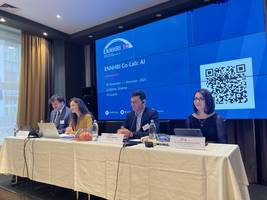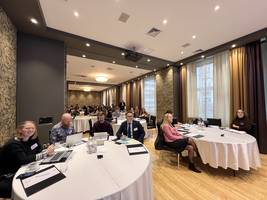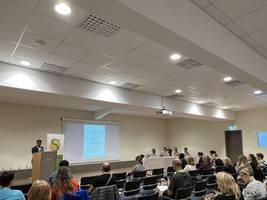The Human Rights Ombudsman of the Republic of Slovenia (Ombudsman) in collaboration with the European Network of National Human Rights Institutions (ENNHRI) has organised an international event about the influence of artificial intelligence on human rights entitled “Co-Lab: AI - ENNHRI Capacity Building Event on Artificial Intelligence”, which will take place today, 30 November, and tomorrow, 1 December 2023, in Ljubljana. The event will be attended by numerous representatives of European national human rights institutions from more than 30 countries and other international experts. Dr Emilija Stojmenova Duh, Minister of Digital Transformation, will also participate at the event, in the exchange of opinions on artificial intelligence.
In his introductory speech, Human Rights Ombudsman Peter Svetina highlighted that the most attention relating to artificial intelligence is focused on the potential to support economic growth, while much less is dedicated to the question of its influence on fundamental rights. The development of artificial intelligence and new technologies create great opportunities, yet simultaneously also risks concerning respect of human rights. “It is essential that the technological development of artificial intelligence is made in an appropriate legal-ethical framework that will strengthen the existing levels of respect for human rights and fundamental freedoms of every individual and reinforce legitimate democratic processes,” said the Ombudsman.
He added that the European Network of National Human Rights Institution (ENNHRI), of which the institution of the Ombudsman is also a member, has been preparing its own positions on the proposal of the Regulation of the European Parliament and of the Council Laying Down Harmonised Rules on Artificial Intelligence and positions on the draft of the Framework Convention on Artificial Intelligence, Human Rights, Democracy and the Rule of Law. ENNHRI stresses the need for national supervisory bodies which will monitor compliance with the mentioned convention and prohibit practices presenting an unacceptable risk from the perspective of respecting human rights and equality. “National human rights institutions working within ENNHRI call for strong and effective protective tools for equality and fundamental rights which would provide an appropriate balance between the development of and trust in artificial intelligence. We also call for the mentioned acts to define collaboration with us and other existing independent institutions. This includes our right to access the information about what algorithms are used by artificial intelligence and the data collected by it for the performance of its tasks. The development of technologies demands from all of us who strive for the protection of rights and freedoms sufficient and quality-based knowledge and clear rules, since this is the only way that violations of rights and dignity of individuals can be prevented,” emphasised Ombudsman Svetina.
The fact is that the field of artificial intelligence is developing rapidly and that its use in the next decade will be widened immensely, hence Ombudsman Svetina also warned about the responsibility of developed Western countries to help developing countries in the field of artificial intelligence, since there is a real risk that the legal and technological vacuum could be entered by countries and private companies who do not place respect of human rights in the development of artificial intelligence high on their priority list. Namely, the use of algorithms, automated decision-making, and other processes have already raised numerous concerns regarding access to personal information and the right to legal protection.
On Friday, the participants will visit the International Research Centre on Artificial Intelligence (IRCAI) under the wing of UNESCO, which in Slovenia operates in the premises of the Jožef Stefan Institute, to exchange views and positions regarding the future development of artificial intelligence from the perspective of ethics.
Ombudsman Peter Svetina also met his Albanian colleague Erinda Ballanca at a bilateral meeting on the sidelines of the conference. They talked about the pressing issues they face in the protection of human rights and fundamental freedoms. They also exchanged some good practices in the work of the institutions they lead.






